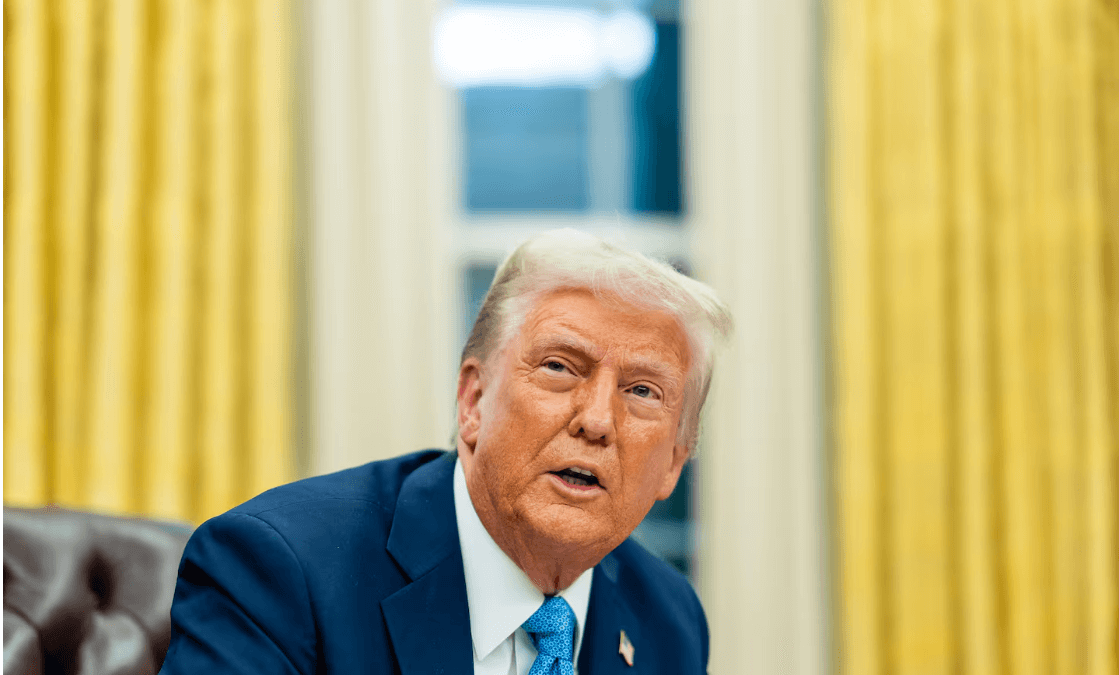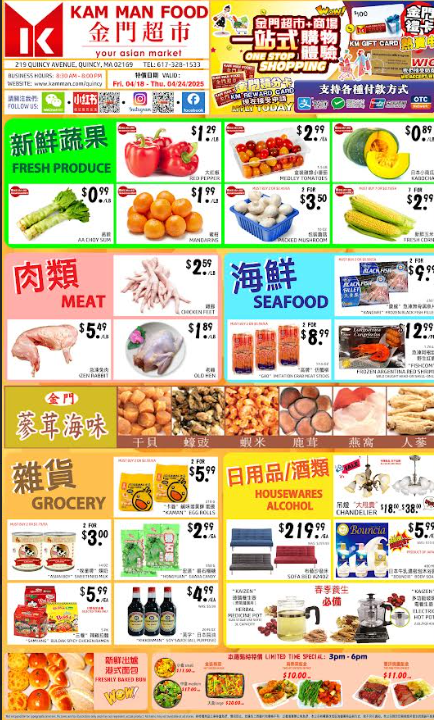特朗普同意暂停对墨西哥征收关税,但对加拿大和中国仍征收进口税

【中美创新时报2025 年 2 月 3 日编译讯】(记者温友平编译)美国总统唐纳德·特朗普和墨西哥总统克劳迪娅·谢因鲍姆周一表示,他们计划的关税将暂停一个月,以留出时间进行进一步谈判,墨西哥表示计划部署 10,000 名国民警卫队成员打击贩毒。美联社对此作了下述报道。
特朗普对加拿大和中国的关税仍定于周二生效,但任何协议的持久性以及关税是否是更广泛贸易战的先兆仍存在不确定性,因为特朗普承诺将征收更多进口税。
两位领导人在特朗普在社交媒体上描述为“非常友好的谈话”后宣布了这一举措,他说他期待即将举行的会谈。
特朗普表示,会谈将由国务卿马可·卢比奥、财政部长斯科特·贝森特、商务部长霍华德·卢特尼克和墨西哥高级代表主持。
“我期待与希恩鲍姆总统一起参加这些谈判,试图在我们两国之间达成‘协议’,”总统说。
作为会谈前的条件,希恩鲍姆列出了边境政策的变化,特朗普确认墨西哥将部署军队。
“墨西哥将立即派遣 10,000 名国民警卫队成员加强北部边境,以阻止从墨西哥向美国贩运毒品,特别是芬太尼,”希恩鲍姆在 X 上发帖称。“美国承诺努力阻止向墨西哥贩运大威力武器。”
特朗普对加拿大和中国的关税仍定于周二生效,而谈判暂停则加剧了紧张局势。由于特朗普承诺将征收更多进口税,因此任何协议的持久性以及关税是否预示着更广泛的贸易战仍存在不确定性。
特朗普在社交媒体上发布消息称,他周一上午与加拿大总理贾斯汀·特鲁多进行了交谈,并将于下午 3 点再次与他交谈。加拿大和墨西哥都计划征收自己的关税以回应美国的行动,但墨西哥暂时搁置了这一计划。
特朗普利用他的社交媒体帖子重申了他的抱怨,即尽管数十年来两国一直保持友好和伙伴关系,从二战到 9/11 恐怖袭击事件,但加拿大一直不合作。
“加拿大甚至不允许美国银行在那里开业或开展业务,”特朗普发帖称。“这是怎么回事?很多这样的事情,但这也是一场毒品战争,美国有数十万人死于墨西哥和加拿大边境涌入的毒品。”
金融市场、企业和消费者正在为可能的新关税做准备。股市开盘时出现小幅抛售,表明人们希望进口税不会持续太久,因为这些进口税可能会推高通胀并扰乱全球贸易和增长。
但前景反映出人们对这位共和党总统的深深不确定性,他曾对关税大加赞赏,甚至说美国政府在 1913 年将所得税作为主要收入来源是一个错误。
特朗普周日表示,如果加拿大和墨西哥加大打击非法移民和芬太尼走私的力度,关税将会取消,尽管目前还没有明确的基准。特朗普还表示,美国不能再与其最大的两个贸易伙伴保持贸易不平衡。
墨西哥面临 25% 的关税,而加拿大对美国进口的商品将被征收 25% 的关税,对其能源产品征收 10% 的关税。特朗普白宫表示,中国因在芬太尼的生产和销售中扮演的角色而面临 10% 的额外关税。
白宫国家经济委员会主任凯文·哈塞特周一表示,尽管有计划的报复和升级风险,但将这场摊牌定性为贸易战是误导性的。
哈塞特说:“读一下行政命令,特朗普总统百分之百地清楚这不是贸易战。这是一场毒品战争。”
但即使这些命令的重点是非法毒品,特朗普自己的言论也往往更多地表达了他对外国通过贸易顺差剥削美国的看法。周日,特朗普表示,很快将对欧盟国家征收关税。他曾讨论过关税既是国家安全问题的外交工具,也是增加收入的方式,也是重新谈判现有贸易协定的工具。
政府外的多名经济学家警告称,关税将推高价格并阻碍经济增长,特朗普本人也表示,在去年竞选时曾承诺可以抑制通胀,但关税会造成一些短期痛苦。
咨询公司 RSM 的首席经济学家乔·布鲁苏拉斯 (Joe Brusuelas) 表示,美国今年不太可能陷入衰退,但关税将损害经济增长并推高政府借贷成本,这可能会使抵押贷款和汽车贷款的利率居高不下。
“如果没有解决方案,对美国经济的影响将是巨大的,”他说。 “随着通胀和利率上升,经济增长将明显低于过去三年 2.9% 的平均水平。10 年期美国国债收益率目前约为 4.5%,可能会攀升至 4.75% 至 5% 之间。”
题图:2025 年 1 月 31 日,特朗普总统在华盛顿白宫椭圆形办公室。埃里克·李/纽约时报
附原英文报道:
Trump agrees to pause tariffs on Mexico, but import taxes still in place for Canada and China
By The Associated PressUpdated February 3, 2025
President Trump in the Oval Office of the White House in Washington, Jan. 31, 2025. ERIC LEE/NYT
WASHINGTON (AP) — U.S. President Donald Trump and Mexican President Claudia Sheinbaum said Monday that their planned tariffs were on hold for a month to give time for further negotiations, and Mexico said it planned to deploy 10,000 members of its national guard to address drug trafficking.
Trump’s tariffs against Canada and China were still slated to go into effect Tuesday, but uncertainty remained about the durability of any deals and whether the tariffs were a harbinger of a broader trade war, as Trump has promised more import taxes to come.
The two leaders announced the move after what Trump described on social media as a “very friendly conversation,” and he said he looked forward to the upcoming talks.
Trump said the talks would be headed by Secretary of State Marco Rubio, Secretary of Treasury Scott Bessent and Secretary of Commerce Howard Lutnick and high-level representatives of Mexico.
“I look forward to participating in those negotiations, with President Sheinbaum, as we attempt to achieve a ‘deal’ between our two Countries,” the president said.
As a condition ahead of the talks, Sheinbaum laid out changes in border policies, and Trump confirmed Mexico’s deployment of troops.
“Mexico will reinforce the northern border with 10,000 members of the National Guard immediately, to stop drug trafficking from Mexico to the United States, in particular fentanyl,” Sheinbaum posted on X. “The United States commits to work to stop the trafficking of high-powered weapons to Mexico.”
The pause added to the drama as Trump’s tariffs against Canada and China were still slated to go into effect Tuesday. Uncertainty remains about the durability of any deals and whether the tariffs are a harbinger of a broader trade war as Trump has promised more import taxes to come.
Trump posted on social media that he spoke Monday morning with Canadian Prime Minister Justin Trudeau and would speak with him again at 3 p.m. Both Canada and Mexico had plans to levy their own tariffs in response to U.S. actions, but Mexico is holding off for the moment.
Trump used his social media post to repeat his complaints that Canada has been uncooperative, despite decades of friendship and partnerships that range from World War II to the response to the 9/11 terrorist attacks on the United States.
“Canada doesn’t even allow U.S. Banks to open or do business there,” Trump posted. “What’s that all about? Many such things, but it’s also a DRUG WAR, and hundreds of thousands of people have died in the U.S. from drugs pouring through the Borders of Mexico and Canada.”
Financial markets, businesses and consumers are trying to prepare for the possibility of the new tariffs. Stock markets opened with a modest selloff, suggesting some hope that the import taxes that could push up inflation and disrupt global trade and growth would be short-lived.
But the outlook reflected a deep uncertainty about a Republican president who has talked with adoration about tariffs, even saying the U.S. government made a mistake in 1913 by switching to income taxes as its primary revenue source.
Trump said Sunday the tariffs would lift if Canada and Mexico did more to crack down on illegal immigration and fentanyl smuggling, though there are no clear benchmarks. Trump also said the U.S. can no longer run a trade imbalance with its two largest trade partners.
Mexico is facing a 25% tariff, while Canada would be charged 25% on its imports to the United States and 10% on its energy products. China is facing a 10% additional tariff due to its role in the making and selling of fentanyl, the Trump White House said.
Kevin Hassett, director of the White House National Economic Council, said Monday that it was misleading to characterize the showdown as a trade war despite the planned retaliations and risk of escalation.
“Read the executive order where President Trump was absolutely, 100% clear that this is not a trade war,” Hassett said. “This is a drug war.”
But even if the orders are focused on illegal drugs, Trump’s own remarks have often been more about his perceived sense that foreign countries are ripping off the United States by running trade surpluses. On Sunday, Trump said that tariffs would be coming soon on countries in the European Union. He has discussed tariffs as both a diplomatic tool on national security issues, a way to raise revenues and a vehicle for renegotiating existing trade pacts.
Multiple economists outside the administration have warned that the tariffs would push up prices and hamper growth, with Trump himself saying there would be some short term pain after having campaigned last year on the promise that he could tame inflation.
Joe Brusuelas, chief economist at the consultancy RSM, said the United States was unlikely to fall into a recession this year, but the tariffs would hurt growth and push up the cost of government borrowing, which would potentially keep the interest rates charged on mortgages and auto loans elevated.
“If there is no resolution, the impact on the U.S. economy will be significant,” he said. “Growth will slow notably from the 2.9% average over the past three years as inflation and interest rates rise. The yield on the 10-year Treasury, currently around 4.5%, could climb to a range between 4.75% and 5%.”

